#Reggie Meyer
Explore tagged Tumblr posts
Text
The Disciples of Evil
Based on a conversation I had with a buddy of mine (shout out to @paladin-of-nerd-fandom65)
It would be cool if there was a group of evil kids similar to the legion of doom (plus a rival to my kid teams)
The name: Disciples of Evil 😈
Rex Luthor: a young nerd kid (born on earth in my universe) with a high IQ that looks up to Luthor and villains in general (compared to other kids who look up to heroes.)
He wears a power armor just like lex Luthor himself, but has a massive arm to deal double damage.
Dr. Light II: Chris Ramsey (nephew of the OG Dr. Light; Nightwing: New Order) was devastated when he learned that his uncle was killed by Robin VI (Jake Grayson, accident) so he create a suit similar to his uncles but more powerful to get revenge
Unknown to him (until later) that the Robin who killed his uncle was his basketball teammate and bully victim was Jake Grayson.
Kid Amazo: Reggie Meyers is a bratty teenaged bully who got the ability to copy abilities from others (plus spilt himself into clones) from a meteor that landed in his backyard.
He wears a outfit similar to the OG kid amazo but purple suit and orange bandanna mask, gloves, and boots
He wears his Amazo suit years later after getting super injured by the super-sons (suit acts like darth Vader and has swords out of the wrists)
War Boy: Isaac Bowers is one of those stereotypical bullies that likes to pick on anybody who is weaker than him a alpha man type of character, a middle school jock with blond buzz cut hair and blue eyes, (rival to Hunter Trevor)
One day after football practice, Ares appears as a glowing orange orb and gives Isaac the powers of Ares himself
I say he wears a black and red gladiator outfit (chest piece is black with red lines, and there is a skull for the belt) and a black and red helmet with red “feathers” or brush on top, also a red cape, plus he has a battle axe that can create fire.
He has all the powers of Ares (strength, speed, fire etc)
Inertia: Thaddeus Thawn is a clone of Bart Allen (impulse and later Blue Mercury in my universe) who has the powers of super speed.
He wears a green, dark green, and black lightning outfit (comics) and has blond hair and gold eyes
Respawn: Jack Wilson (name I give him in my universe) is a young villian who is a secret kid of deathstroke, who also looks up to him and wants approval.
He wears a half orange and half black deathstroke outfit with a leather jacket over it
Jack is a well trained kid that has a healing factor like his dad.
Kid America/Earth Boy: James Oliver is a young kid who is also a member of the Blue Earth Movement, who hates illegal aliens (both outer space and on earth) and is a patriot who puts America first (thanks to conservative upbringing)
He wears a blue skin tight suit with white markings around the waist and some on the elbow (think of the outfits the super powered members wears) and wears a red cape, a American flag, or a white cape that shows earth on it.
In my universe, the super powered members have magic energy (blasts, beams etc) instead of stolen Kryptonian powers.
Got any questions, comments, or concerns (maybe suggestions too) let me know ;)
#Rex Luthor#disciples of evil#dr light#chris ramsey#kid amazo#Reggie Meyer#war boy#Issac bowers#thaddeus thawne#respawn#deathstroke#slade wilson#kid America#earth boy#earth 66
11 notes
·
View notes
Text
Literally it’s almost 2025. You can let Harry Potter go, it’s okay 🫂
#like genuinely#the amount of queer people who make this a cornerstone of their personality is actually insane to me#please#astrology or the meyers briggs is right there#something#anything else#I don’t care about severed snake#or Reggie the weasel#like for fucks sake
65 notes
·
View notes
Text
Listening Post: John Coltrane/Eric Dolphy’s Evenings at the Village Gate
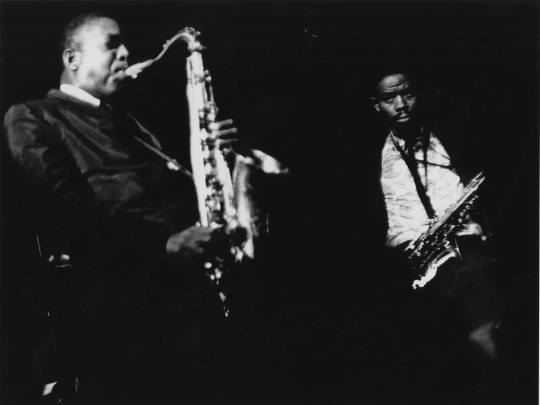
In 1961, John Coltrane was reaching a wider audience via his edited single version of the Sound of Music classic "My Favorite Things.” He was also, although it seems trite to say given the trajectory of his career, in a state of transition. Moving away from his "sheets of sound" period to exploring modality, non-western scales and polyrhythms which allowed him to improvise more deeply within the constraints of more familiar Jazz tropes.
His personal and musical relationship with Eric Dolphy was an important catalyst for the development of his sound. Dolphy was an important presence on Coltrane's other key album from 1961, Africa/Brass and here officially joins the quartet on alto, bass clarinet and flute. Evenings at the Village Gate was recorded towards the end of a month-long residency with a core band of Coltrane, Dolphy, Jones, McCoy Tyner on piano and Reggie Workman on bass. The other musician featured here, on "Africa,” is bassist Art Davis.
The recording captures the band moving towards the more incandescent sound that made Live at the Village Vanguard, recorded just a few weeks later in November 1961, such a viscerally thrilling album. The hit "My Favorite Things" and traditional English folk tune "Greensleeves" are extended into long trance-like vamps. Benny Carter's 1936 classic "When Lights Are Low" showcases Dolphy's bass clarinet and in the originals "Impressions" and particularly "Africa" the quintet hit almost ecstatic grooves. Dolphy's solos push Coltrane further into the spiritual free jazz that so divided later audiences. Dolphy's flute on "My Favorite Things" and especially his clarinet on "When Lights Are Low" are extraordinary, particularly the clarity of his upper register.
The highlight for me is the 22 minute version of "Africa" that closes the set. The two basses, bowed and plucked, Tyner's chordal work and solo, the slow build from the bass solo where the music seems to meander before Jones' explosive solo heralds the return of Dolphy and Coltrane improvising together on the theme, spiralling up the register, contrasting Coltrane's long slurries with Dolphy's staccato bursts which lead to the thunderous conclusion.
As an archivist, sudden discoveries in forgotten basement boxes never surprises and the excitement never gets old. The tapes of Evenings at the Village Gate were recently unearthed in the NY Public Library sound archive after having been lost, found and lost again. Recorded by the Village Gate's sound engineer Rich Alderson these tapes were not meant for commercial use but rather to test the room's sound and a new ribbon microphone. As Alderson says in his notes, this was the only time he made a live recording with a single mic and, yes, there have been grumblings from fans and critics about the sound quality and mix particularly the dominance of Elvin Jones' drums. For me, one the best things about this is that you hear how integral Jones is not just as a fulcrum for the other soloists but as an inventive polyrhythmic presence, playing within and around his bandmates. I know that many of the Dusted crew are Coltrane fans and would love to hear your takes on the music and whether the single mic recording affects your enjoyment in any way.
Andrew Forell
youtube
Justin Cober-Lake: There's so much to get into here, but I'll respond to your most direct question. The single-mic recording doesn't affect my enjoyment at all. I understand (sort of) the complaints, but I think they overstate the problem. More to the point, when I hear an archival release, I really want to get something new out of it. That doesn't mean I want a bad recording, but there's not too much point in digging up yet-another-nearly-the-same show (and I have nearly unlimited patience for Coltrane releases) or outtakes that give the cuts the same basic idea but just don't do it as well. I was really looking forward to hearing Coltrane and Dolphy interact, and nothing here disappoints. Having Jones so dominant just means I get to hear and think more about the role he plays in this combo. It would sound better to have the other instruments a little more to the fore, but it's not a problem (and actually Tyner's the one I wish I could hear a little better).
I think your topic suggests ideas about what these sorts of recordings — when made publicly available — are for. Is it academic material (the way we might look at a writer's journals or correspondence)? Is it to get truly new and good music out there? Is it a commercial ploy? Is it a time capsule to get us in the moment? The best curating does at least three of those with the commercial aspect a hoped-for benefit. This one probably hits all four, but I suspect the recording pushes it a little more toward that first category.
Bill Meyer: I’m playing this for the first time as I type, and I’m only to track three, so my (ahem) impressions could not be fresher.
First, I’ll say that, like Justin, I have a lot of time for Coltrane, and especially the quartet/quintet music from the Impulse years. The band’s on point, it sounds like Dolphy is sparking Coltrane, and Jones is firing up the whole band. Tyner’s low in the mix and Workman’s more felt than heard; the recording probably reflects what it was like to actually hear this band most nights, i.e. Jones and the horn(s) were overwhelming.
How essential is it? If you’re a deep student of Coltrane, there are no inessential records, and the chance to hear him with Dolphy, fairly early on, should not be passed up. But if you’re big fan, not a scholar, then you need to get The Complete 1961 Village Vanguard Recordings box and the 7-CD set, Live Trane: The European Tours, before you drop a penny on this album. And if you’re just curious, start with Impressions. This group is hardly under-documented. The sound quality, while tolerable, is compromised enough to make Evenings At The Village Gate less essential than everything I just mentioned.
I’m only just now starting to play “Africa,” so I’ll check in again after I play that.
“Africa” might be the best reason for a merely curious listener to get this album. It’s very exploratory, the bass conversation is almost casual (not a phrase I use much when discussing Coltrane), and they manage to tap into the piece’s inherent grandeur by the end.
“Africa” is a great example of this band working out what they’re doing while they’re doing it.
Andrew Forell: On Justin’s points about the function of archival releases, I’ve been going back and forth on the academic versus time capsule/good music uncovered question. There is a degree of cynicism and skepticism in these days of multidisc, anniversary box sets in arrays of tastefully colored vinyl which seemed designed for the super(liquid)fan and cater to a mix of nostalgia and fetish. Having said that specialist archival labels have done us a great service unearthing so much "lost" and under-represented music. On one hand I agree with your summation and to Bill’s point, yes this quintet has been pretty thoroughly documented and yes the Vanguard tapes would be the place to start. But purely as a fan I am more interested in live recordings than discs of out- and alternative takes. I’m thinking for example of the 1957 Monk/Coltrane at Carnegie Hall and Dolphy’s 1963 Illinois concert especially his solo rendition of “God Bless the Child," recordings that sat in archives for 48 and 36 years respectively.
youtube
By contrast, the other recent Coltrane excavation, Both Directions at Once is wonderful but I’m not listening to it as an academic exercise, taking notes and mulling over the different takes, interesting as they are. I approach Evenings as another opportunity to hear two great musicians, in a live setting, early on in their short partnership. As Justin says, this aspect doesn’t disappoint. I agree with Bill that the mix is close to what you would you hear in the room, the drums and horns to the fore. All this is a long way to a short answer. A moment in time, a band we’ll never experience in person and when all is said and done, 80 minutes of music I’d otherwise not hear.
Jonathan Shaw: As a relative newb to this music, I can't contribute cogently to discussions of this set's relative value. Most of the Coltrane I've listened to closely is from very late in his life, when he was playing wild and free--big fan of the set from Temple University in 1966 and the Live at the Village Vanguard Again! record from the same year. None of that is music I understand, but I feel it and respond to it strongly. The only Dolphy I've listened to closely is Out There. So I'll be the naif here.
I need to listen to these songs another few times before I can say anything about them as songs, but I really love the right-there-ness of the sound. I like being pushed around by the drums and squeezed between the horns (the first few minutes of "Greensleeves" are delightful in that respect). Maybe I'm lucky to come to the music with so little context. It's a thrill to hear the playing of these folks, about whom there is so much talk of collective genius. Perhaps because my ears are so raw to these sounds, I feel like that talk is being fleshed out for me.
Jim Marks: I think that this release has both academic and aesthetic (if that’s the right word) significance for Dolphy’s presence alone. I am more familiar with the original releases than the various re-releases from the period, but it’s my impression that there just isn’t that much Dolphy and Trane out there; for instance, I think Dolphy appears on just one cut of the Village Vanguard recordings (again, at least the original release). In particular, I’ve heard and loved various versions of “Favorite Things,” but this one seems unique for the six-plus-minute flute solo that opens the track. The solo is both brilliant in itself and creates a thrilling contrast with Coltrane when he comes in. This track alone is worth the price of admission for me.
Marc Medwin: I agree concerning Dolphy's importance to these performances, and while there is indeed plenty of Coltrane and Dolphy floating around (he took part in the Africa/Brass sessions that gave us both Africa and a big band version of "Greensleeves") his playing is really edgy here. Bill is right to point toward the sparks Dolphy's playing showers on the music. Yes, the flute on "My Favorite Things" is really stunning. He's all over the instrument, even more so than in those solos I've heard from the group's time in Europe.
Jon, I'd suggest that there's a strong link between the albums you mention and the Village Gate recordings we're discussing, a kind of continuum into which you're tapping when you describe the excitement generated by the playing. The musicians were as excited at the time as we are on hearing it all now! It was all new territory, the descriptors were in the process of forming, and while Cecil Taylor, Ornette Coleman, Sun Ra and a small group of kindred spirits were already exploring the spaceways, they were marginalized. That may be a component of the case today, but it's tempered by a veneration unimaginable at the time. That's part of the reason Dolphy lived in apartments where the snow came through the walls. Coltrane had plenty to lose by alienating the critics, but ultimately, it did not stop his progress. These recordings mark an early stage of that halting but inexorable voyage. With the possible exception of OM, Coltrane's final work never abandoned the tonal and modal extremes at which he was grabbing in the spring and summer of 1961.
Jennifer Kelly: Like Jon, I'm not well enough versed in this stuff to put it context or even really offer an opinion. I'm enjoying it a lot, and I, also, like the roughness and liveness of the mix with the foregrounded drums. But I think mostly what I am drawn to is the idea that this show happened in 1961, the year I was born, and that these sounds were lost for decades, and now you can hear them again, not just the music but the room tone, the people applauding, the shuffling of feet etc. from people who are almost all probably dead now. It seems incredibly moving, and I am also taken by the part that the library took in this, in conserving this stuff and forgetting it had it and then rediscovering it. In this age of online everything-available-all-the-time, that seems remarkable to me, and proves that libraries are so crucial to civilization now and always, even as they're under threat.
Marc Medwin: A real time machine, isn't it? We are fortunate that we have these documents at all, and yes, the story of the tapes resurfacing is a compelling one! To your observations, audience reaction seems pretty enthusiastic to music that would eventually be dubbed anti-jazz by prominent members of the critical establishment!
Bill Meyer: I can imagine this music being more sympathetically received by audiences experiencing its intensity, whereas critics might have fretted because it represented a paradigm shift away from bebop models, so they had to decide if it was jazz or not.
It is amusing, given the knowledge we have of what Coltrane would be playing in five years, that this music is where a lot of critics drew a line in the sane and said, "this is antijazz."
Jon Shaw: Yes, Bill, that seems bonkers to me. I am particularly moved by the minutes in that 1966 set at Temple when Coltrane abandons his horn altogether and starts beating his chest and humming and grunting. Wonder what the chin-stroking jazz authorities made of that.
Given my points of reference, this set sounds so much more musically conventional. But the emotional force of the music is still immediate, viscerally present. Beautifully so.
youtube
Andrew Forell: In retrospect, all those arguments seem kind of crazy. Yesterday’s heresies become tomorrow’s orthodoxies but what we’re left with is, as Jonathan says, the visceral beauty of Coltrane’s striving for transcendence and his interplay with Dolphy’s extraordinary talent which we hear here working as a catalyst for Coltrane. As Marc and Jen note the audience is there with them..
Come Shepp, Sanders & Rashid Ali, the inquisitors’ fulminations only increased and you think what weren’t you hearing?
Marc Medwin: I was just listening to a Jaimie Branch interview where she's talking about her visual art, about throwing down a lot of material and finding the forms within it. I think that might be another throughline in Coltrane's and certainly Dolphy's work, a gradual discarding of traditional forms and poossibly structures based on what I hate to call intuition, because it diminishes the process.
Then, I was thinking again about our discussion of the critics. I see their role, or their assessment of that role, as a kind of investment without reward, and yeah, it does seem bonkers now! Bill Dixon once talked about how the writers might spend considerable time and expend commensurate energy learning to pick out "I Got Rhythm" on the piano, and they're suddenly confronted with... well, the sounds we're discussing! What would you do, or have done, in that situation? It's really easy for me, like shooting fish in the proverbial barrel, to disparage critical efforts of the time, especially in light of the ideas and philosophies Branch and so many others are at liberty and encouraged to play and express now, but I wonder how I would have reacted, what my biases and predilections would have involved at that pivotal moment.
Ian Mathers: The points about historical reception are really interesting, I think. There's a famous (in Canada!) bunch of Canadian painters called the Group of Seven, hugely influential on Canadian art in the 20th century and still well known today. In all the major museums, reproductions everywhere, etc. They were largely landscape painters, and while I think most of the work is beautiful, it's so culturally prominent that it runs the risk of seeming boring or staid. I literally grew up with it being around! So it was a delightful shock to read a group biography of them (Ross King's Defiant Spirits: The Modernist Revolution of the Group of Seven, if anyone is hankering for some CanCon) and see from contemporary reviews that people were so shocked and appalled by the vividness of their colour palettes and other aesthetic choices that they were practically called anti-art at the time. It's not surprising to me that this music would both attract similar furore at the time and, from the vantage point of a new listener in 2022 who loves A Love Supreme and some of the other obvious works but hasn't delved particularly far into Dolphy, Coltrane live, or this era in jazz in general (that would be me), be heard and felt as great, exciting, but not exactly formally radical stuff.
I don't think I would have noticed much about the recording quality were people not talking about it. "My Favorite Things" seems to have the overall volume down a bit, but still seemed pretty clear to me (agree with the assessments above; Coltrane, Dolphy, and Jones very forward, others further back although even when less prominent I find myself 'following' Tyner's work through these tracks more often than not), and starting with "When Lights Are Low" that seems to be corrected. It actually sounds pretty great to me! Although I absolutely defer to Bill's recommendations for better starting places for serious investigations, I can also say as a casual but interested fan who tends to quail in the face of box sets and other similarly lengthy efforts this feels from my relatively ignorant vantage like a perfectly nice place to start. I like Justin's rubric for why these releases might come about (or be valuable), but if I hadn't heard any Coltrane and you just gave me this one, my unnuanced perspective would just be something like "wow, this is great!" But maybe I'm underthinking it. And having that reaction doesn't mean that others aren't right to recommend better/more edifying entry points, or that having that reaction shouldn't lead one to educate oneself.
Jonathan Shaw: Maybe it's a lucky thing for me to be so poorly versed in Coltrane's music, not just in the sense of having listened to precious little of it. I am even less familiar with the catalog of music criticism, which in jazz seems to me voluminous, archival in scale. But even with music I'm extensively engaged with — historically, critically — I try to understand it and also to feel it. I can't imagine not feeling what's exciting in this music, energizing and challenging in equal measure.
Like Marc, I don't want to recursively impugn the critical writing of folks working in very different contexts. But I don't like it when the thinking gets in the way of the music's emotional and aesthetic force, which to me feels unmistakably powerful here.
Ian Mathers: Yeah, maybe that's a good distinction to draw; I can imagine in a different time and place feeling like the music here is more radical or challenging than it sounds to us now. But I can't quite imagine not getting a visceral thrill out of it.
Marc Medwin: And doesn't this contradiction get at the essence of what we're trying to do? Those of us who've chosen to write about music are absolutely stuck grasping at the ephemeral in whatever way we're able! How do we balance the ordering of considerations and explanations in unfolding sentences with the spontaneity of action and reaction that made us pick up a pen in the first place?! We add and subtract layers of whatever that alchemical intersection of meaning and energy involves that hits so hard and compels us to write! In fact, the more time I'm spending with these snapshots of summer 1961, the more I decamp from my own philosophizing about critical relativity to sit beside Ian. The stuff is powerful and original, and the fact that so much of what we're hearing now is a direct result of those modal explorations and harmonically inventive interventions says that the dissenting voices were fundamentally, if understandably, wrong! It could be that the musician can be inclusive in a way the writer simply can't.
I'm listening to "Africa" again, which is for me the disc's biggest single revelation in that it's the only concert version we have, so far as I know. How exciting is that Jones solo, and how much does it say about his art and the group's collective art?!! He starts out in this kind of "Latin" groove with layers of swing and syncopation over it, he goes into a melodic/motivic thing like you'd eventually hear Ginger Baker doing on Toad, and then eases back into the groove, all (if no editing has occured) in about two minutes. He's got the music's history summed up in the time it would take somebody to get through a proper hello!! Took me longer to scribble about it than for him to play it!!
Justin Cober-Lake: I'm not sure if Marc is making me want to put down or pick up a pen, but he's definitely making me want to listen to "Africa" again. (Not that I needed much encouragement.)
Andrew Forell: Africa/Brass was the first jazz album I bought. Coming from post-punk, I found it immediately the most exciting and challenging music I’d heard and it set me off on my exploration of Coltrane, Dolphy, Coleman and their contemporaries. This version of “Africa” is a highlight for me also for all the reasons Marc, Ian and Jon have talked about.
Bill Meyer: Yeah, "Africa" is quite the jam!
A thought about critical perspective — our discussion has gotten me thinking, not for the first time, about the impacts of measures upon experience, and the limits of critical thinking when I’m also an avid listener. If I’m listening for “the best” Coltrane/Dolphy, in terms of sound quality or most focused performances, this album isn’t it. But if I’m looking for excitement, this album has loads of it, and that might be enhanced by the drums-forward mix.
#listening post#dusted magazine#john coltrane#eric dolphy evenings at the village gate#jazz#reissuemmc#mccoy tyner#reggie workman#derek taylor#art davis#new york public library#andrew forell#justin cober-lake#bill meyer#africa#jonathan shaw#jim marks#mark medwin#jennifer kelly#ian mathers#Youtube
15 notes
·
View notes
Text
WCDE National Title Results 2014
WCDElite Titles:
Mini Female:
Kailey Quinn, DP
Jasmine Jade, First Dance Project
Bailey Sok, DP
Mini Male:
Landon Spurbeck, Allegro PAA
Joshia Kim, DP
Teddy Mielke, SAS Dance
Junior Female:
Lauren Yakima, NDSoD
Kendall Boston, Allegro PAA
Keely Meyers, Danceology
Junior Male:
Jamaii Melvin, Dance Empire
Reggie Valdez, DP
James Ades, Allegro PAA
Teen Female:
Londyn Alexander, International CPA
Addison Moffeet, Club
Effie Tutko, Allegro PAA
Teen Male:
Lennon Torres, DC Scottsdale
Timmy Blankenship, Kinesis
Graham Feeny, Company C
Senior Female:
Hayden Hopkins, Westlake
Addie Byers, Intermix
Isabela Medina, Dance Empire
Senior Male:
Christopher Lucas, The Studio
Matthew Rogers, Danceology
Noah Field, NDSoD
9 notes
·
View notes
Note
I have a question about Solar Flame (my obsession):
Do you WANT to write following the canon plot points in the twilight series, or do you just take that AU and write however you want and just fly by the seat of your pants?
Do you find yourself 'restricted' in needing to be like "okay Bella's dad bought her a truck so that will happen here?" How do you pick in choose what canon stays and what characterisations you want to write over (aside from the toxic problematic stuff Meyer wrote)? Or are the things you keep in from the books, things that you liked and want to include here in this fiction?
xoxoxo Golden King is uh-mazing but y'all, Solar Flame is where it's ATTT (low key hoping Regulus feeds on Jamesie soon bc Reggie deserves the world)
my idea was to follow the same general plot to start and then let it spin out from there as the characters change and grow. i think the twilight portion will be pretty similar, just plot development wise, but eventually it’ll change a lot.
i honestly find the structure of replicating twilight elements really comforting and though i’ve added a lot, certain iconic elements (like bella’s truck) just have to play a part. the rest i’ll just throw out, but i’ve been trying to just let the character lead me where they want to go. like i designed them and now i get to watch how they behave
13 notes
·
View notes
Text
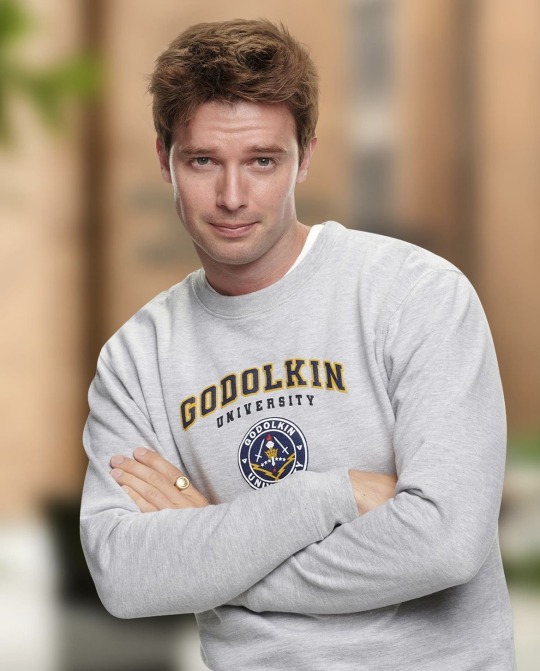
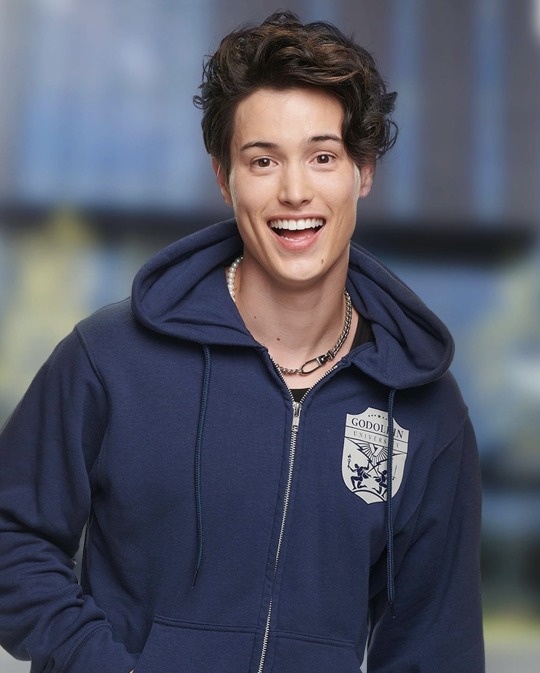
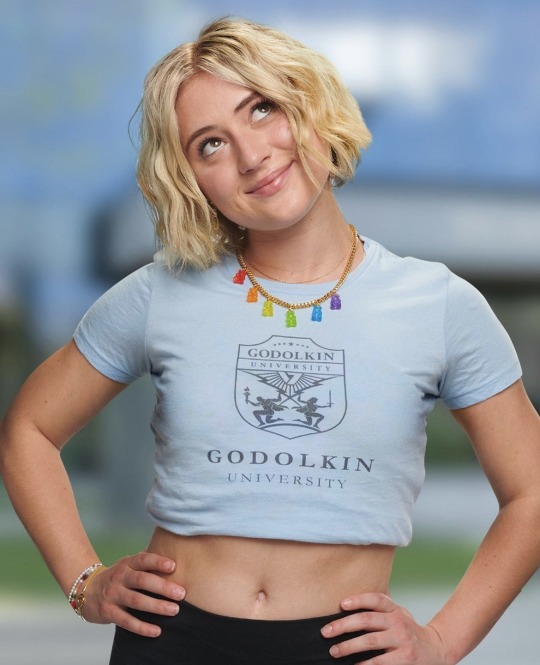

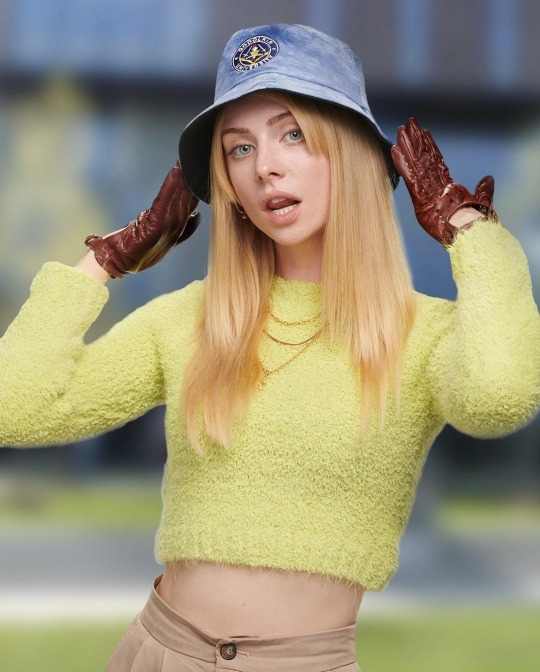
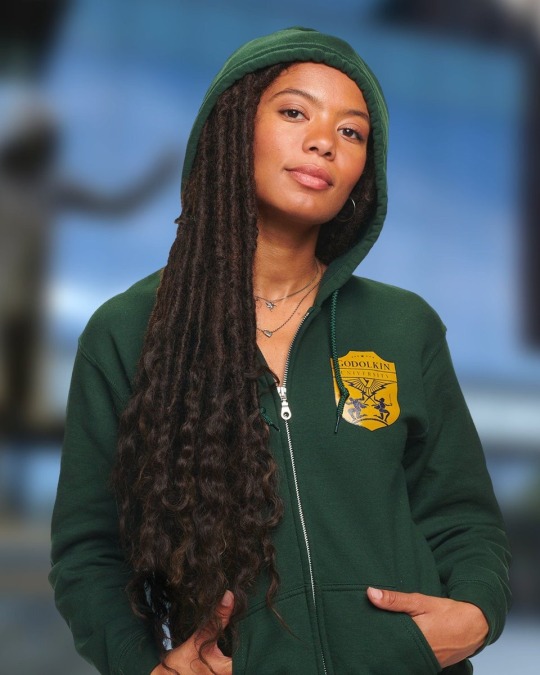
Gen V is an American superhero television series, developed by Craig Rosenberg, Evan Goldberg, and Eric Kripke, serving as a spin-off of The Boys by Kripke, and based on The Boys comic book story arc "We Gotta Go Now" by Garth Ennis and Darick Robertson. The series serves as the third entry in The Boys franchise.
The series, set concurrently with the fourth season of The Boys, premiered on Amazon Prime Video on September 29, 2023. In October 2023, less than a month after its premiere, the series was renewed for a second season.
Premise
Young adult superheroes, or "supes", are tested in battle royal challenges at the Godolkin University School of Crimefighting founded by Patrick Godolkin run by Vought International.
Cast
Main
Jaz Sinclair as Marie Moreau, a hemokinetic (the ability to psychically manipulate blood) Supe with a tragic past.
Jaeda LeBlanc portrays a young Marie.
Chance Perdomo as Andre Anderson, a popular student and Luke's best friend with magnetic manipulation capabilities.
Lizze Broadway as Emma Meyer / Little Cricket, a Supe with the ability to alter her size by "purging" or eating.
Maddie Phillips as Cate Dunlap, a Supe with telepathic abilities, primarily in the form of tactile mind control, and Luke's longtime girlfriend.
Violet Marino portrays a young Cate.
London Thor and Derek Luh as Jordan Li, a Supe gender-shifter. Thor portrays Jordan's feminine form who can fire energy blasts and Luh portrays Jordan's masculine form who has superhuman durability.
Asa Germann as Sam Riordan, a young Supe with superhuman strength and durability.
Cameron Nicoll portrays a young Sam.
Shelley Conn as Indira Shetty, the dean of Godolkin University and former behavioral therapist who does not have superpowers.
Recurring
Patrick Schwarzenegger as Luke Riordan / Golden Boy, Sam's older brother and a popular student with pyrokinesis and superhuman strength.
Maia Jae Bastidas as Justine Garcia, a Supe influencer attending the Crimson Countess School of Performing Arts
Daniel Beirne as Social Media Jeff, the social media manager for Godolkin University.
Sean Patrick Thomas as Polarity, Andre's dad and a famous superhero who is a trustee at Godolkin University.
Alexander Calvert as Rufus, a psychic student at Godolkin University who possesses telepathy, astral projection, and clairvoyance.
Marco Pigossi as Dr. Edison Cardosa, a therapist at "The Woods".
Guest
Ty Barnett as Malcolm Moreau, Marie's father
Miata Ada Lebile as Jackie Moreau, Marie's mother
Robert Bazzocchi as Liam, a classmate of Emma's
Alex Castillo as Vanessa Haycraft III
Clancy Brown as Richard "Rich Brink" Brinkerhoff, a renowned professor at Godolkin University and Chairman of the Lamplighter School of Crimefighting.
Warren Scherer as The Incredible Steve, a student with a healing factor sufficient to reattach lost body parts.
Jessica Clement as Harper, a rat-tailed student at Godolkin University.
Siddharth Sharma as Tyler Oppenheimer, a student with intangibility.
P.J. Byrne as Adam Bourke
Jackie Tohn as Courtenay Fortney
Matthew Edison as Cameron Coleman
Laura Kai Chen as Kayla Li, Jordan's mother.
Peter Kim as Paul Li, Jordan's father who disapproves of their gender-shifting ability.
Derek Wilson as Robert Vernon / Tek Knight, a former supe turned true-crime TV host who uses his show to cover up scandals for Vought.
Jason Ritter as himself via Sam's hallucinations of an episode of the educational TV series Avenue V.
Andy Walken as Dusty, a Supe resembling a teenager whose body ages slowly.
Special guests
Elisabeth Shue as Madelyn Stillwell
Jessie T. Usher as Reggie Franklin / A-Train
Colby Minifie as Ashley Barrett
Chace Crawford as Kevin Moskowitz / The Deep
Jensen Ackles as "Soldier Boyfriend", Cate's childhood imaginary friend who is based on the films of Soldier Boy
Claudia Doumit as Victoria Neuman
15 notes
·
View notes
Text
MUSE LIST.
(Will be added to as time goes on).
Derek Venturi (Michael Seater)
Stiles Stilinski (Dylan O'Brien)
Lydia Martin (Ellie Bamber)
Billy Loomis (Skeet Ulrich)
Stacey Copeland (Lili Reinhart)
Evan Copeland (Matthew Daddario)
Cadence Mitchell (Hailee Stienfield)
Seth Mitchell (Dylan O'Brien)
Owen Grant (Jack Falahee)
Anna Sawyer (Megan West)
Sadie Hawthorne (Dove Cameron)
Connor Russo (Matthew Gray Gubler)
Bennett Campbell (Crystal Reed)
Dakota Harper (Dylan O'Brien)
Rafael Vigara (Noah Centineo)
Savannah Grace (Renee Rapp)
Noah Davis (Jordan Fisher)
Scarlett Arnolds (Taylor Swift)
Meghan Cooper (Danielle Campbell)
Jeremy Lodge (Peyton Meyer)
Felicty St. James (Selena Gomez)
Landon Royce (Harrison Osterfield)
Quill McKeon (Alberto Rosende)
Lilith Balthory (Devory Jacobs)
Aphrodite Lafont (Leven Rambin)
Simon Lewis (Alberto Rosende)
Reggie Peters (Jeremy Shada)
Audrey Stevens (Katerina Tannenbaum)
Jesse Anderson (Jeremy Strong)
Willow Evans (Sabrina Carpenter)
Finn Langston (Chase Stokes)
Harper Finkle (Jennifer Stone)
Allison Watts (Danielle Rose Russell)
Henry Fox (Nicholas Galitzine - previously found on princehenrytheutterlydaft but because tumblr sucks he is moved here for now)
Siobhan Davis (Charli Wookey)
Katelyn Alvarez (Adria Arjona)
2 notes
·
View notes
Text
[ID: A playlist in darkmode that says the following:
Hi, My Name Is Gretchen Calder
Ebony Luv Docta
Darkness Eminem
Dementia Owl City, Mark Hoppus
Raven Way Noolix
And I Ciara
Have Michael Love Michael, Chelsea…
Long Cheville
EBONY BLACK Carson Campbell
Hair Little Mix
That's How D12
I Got Young the Giant
My Name From Ashes To New
With… INFINITE
Purple Streaks Emot
and EDEN
Red Taylor Swift
That! Andre Nickatina
Reach S Club 7
ES Crying
M The Cure
Y iamwhoiam
Mid Teezo Touchdown
Back Jeezy, Yo Gotti
and EDEN
Icy Blue 7 Year Bitch
Eyes Rouge Wave
Like Alissic
Limpid Forsaken Autumn
Tears Meep
and EDEN
A Lot of People del canto.
Tell Me Groove Theory
I Aphex Twin
Look Like Yung Pinch
Amy Alexandre Desplat
Lee Tenacious D
A The Gits
N Jaden
If You Don't Know Molotov Cocktail Piano
Who Jason Lauv
She Is The Fray
G Labraford
E.T Katy Perry
DA PNL
Hell Squirrel Nut Zippers
Out of Here A.J. Holmes
I'm Not Panda Bear
Related Fiobots
To The Neighborhood
Gerard Way dying in designer, Lil Xtra
But K. Cero
I Wish I Was The Avett Brothers
BEcause Dreamcatcher
He Is Ghost
A The Gits
Major Young Dolph, Key Glock
Fucking David Banner, Jazze Pha
HOTTIE BROCKHAMPTON
I'n a Vampire Future Bible Heroes
But C. Kero
My Teeth Pic Louds
Are Dens, Laura McElroy
Straight T-Pain
and EDEN
White Frank Ocean, John Meyer
I Have DJ Mason
Pale White Yann Tiersen & Shannon Wright
Skin Sabrina Carpenter
I Aphex Twin
M The Cure
Also Cdot Honcho
A Witch John Petersen
And I Go 16Volt
To The Neighborhood
A The Gits
Magic Pilot
School Nirvana
Called Lstn, Rohn Dahlberg
Hogwarts Endigo
In Carrie: The Musical Ensemble
England The National
Where Tekino
I'm In Keith Urban
The Seventh Year Shadowland
I Aphex Twin
M The Cure
Seventeen MARINA
I'm a Goth Tor
In Case Demi Lovato
You Regard, Troy Sevant, Tate McRae
Couldn't Tell Dermot Kennedy
and EDEN
I Aphex Twin
Wear Ken Ashcorp
Mostly Black Midagmus
I Love Joyner Lucas
Hot Topic Le Tigre
And I Ciara
Buy Burna Bandz
All My Clothes Civil Twilight
from Adrienne Lenker
…There Andy Mineo
For Example Postcode War
Today The Smashing Pumpkins
I Was Florist
A The Gits
Black Pearl Jam
Corset Keigo., Paulo Herrera
With… INFINITE
Matching Jaskaran Riar
Lace Random Rab
Around It Pat Cooper
and EDEN
A The Gits
Black Leather Call Me Karizma
Miniskirt AOA
Pink Aerosmith
Fishnets Model City
and EDEN
Black Dierks Bentley
Combat Boots Mato, Liv the Artist
I Was Florist
Wearing Wilsen
Black Lipstick Chicano Batman
White Frank Ocean, John Meyer
Foundation Years & Years
BLACK EYELINER AOL, doin' fine
and EDEN
Red Eye YoungBoy Never Broke Again
Shadow FRVR FREE
I Was Florist
Walking Outside Make Up Girl
Hogwarts Endigo
It Was Chely Wright
Snowing and Raining Guitar Slim, Jelly Belly
So There Ben Folds
Was John Chin, Richard Julian
No Sun Turnover
Witch Cold
I Was Florist
Very Happy Moses Khumalo
A Bout Bad Bad Hats
a lot 21 Savage
O Coldplay
F Reggie And The Full Effect
P Venetian Snares
Reps Kali Muscle
Stare Rory Adams
D LITE
At Me KEVZOR
I Aphex Twin
Put Up Brookroyal
M The Cure
Y iamwhoiam
Middle Finger Bohnes
@@@@@ Arca
Them Misfits
/end ID.]

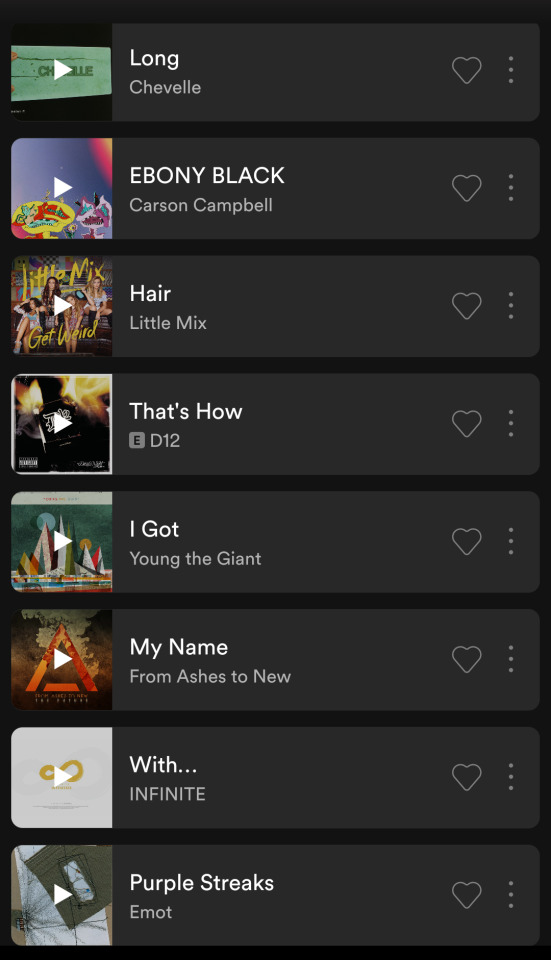
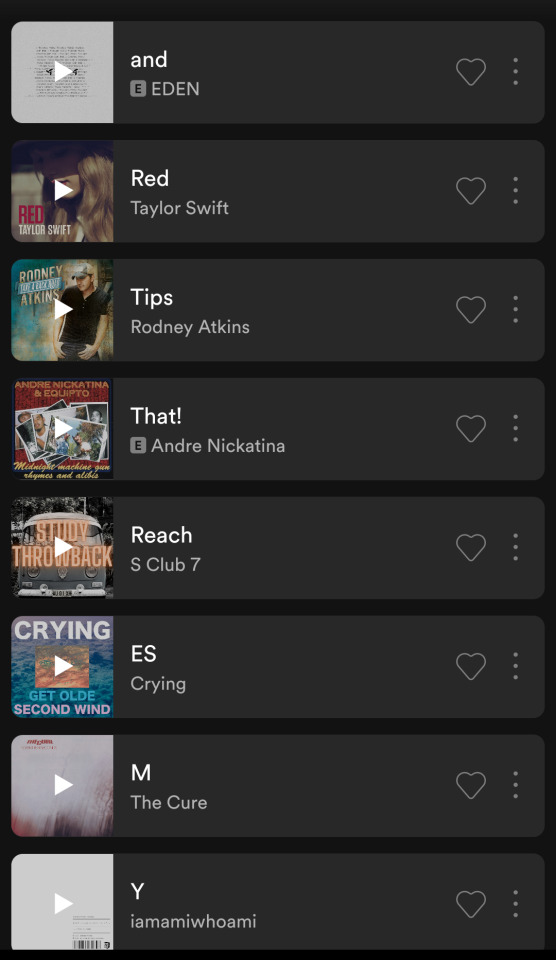
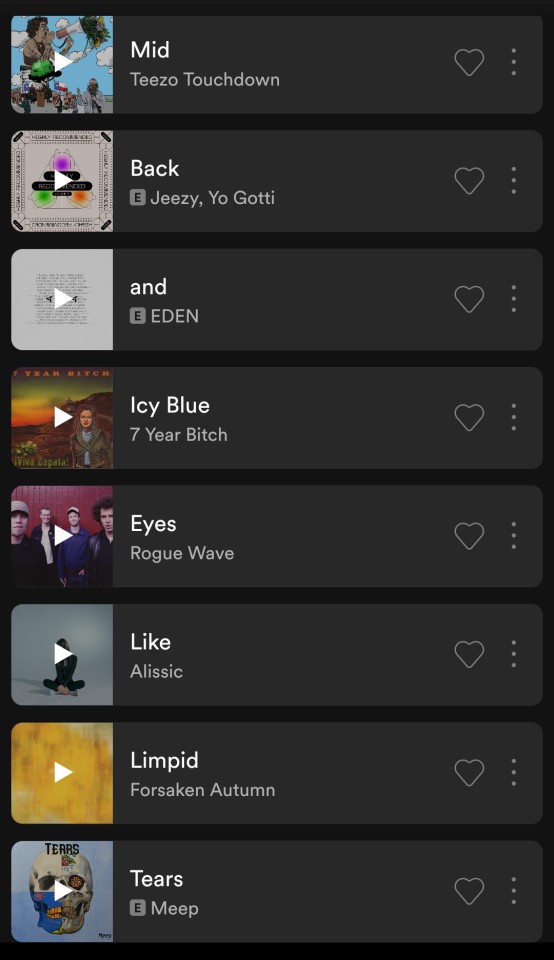

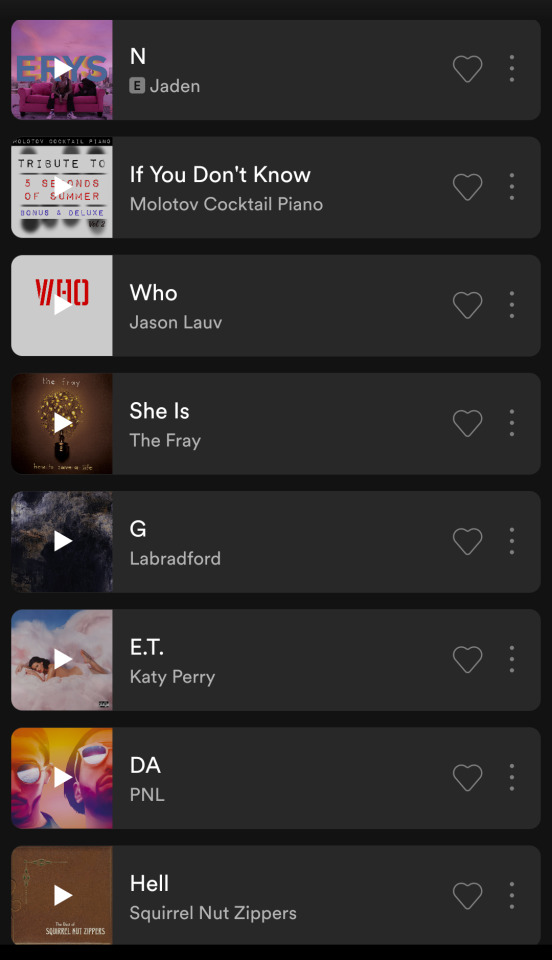
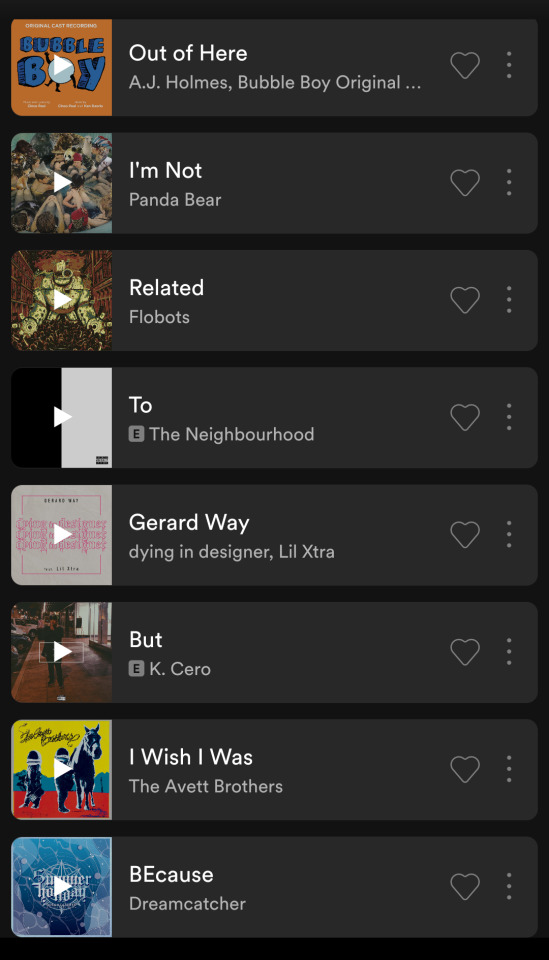
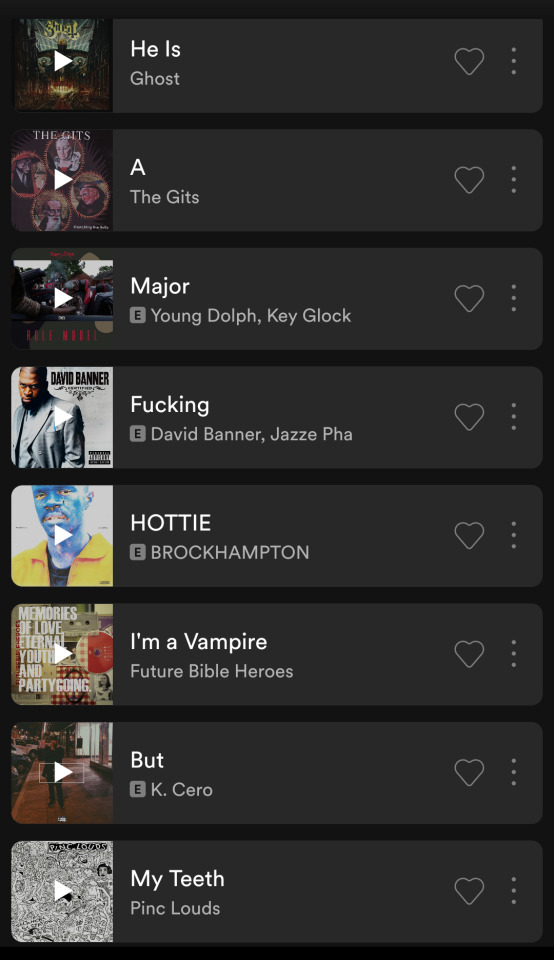
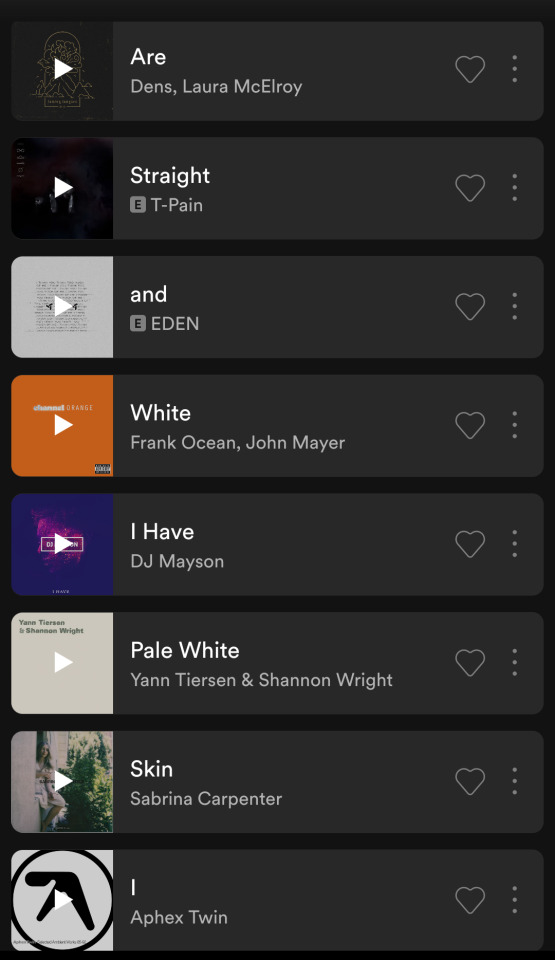
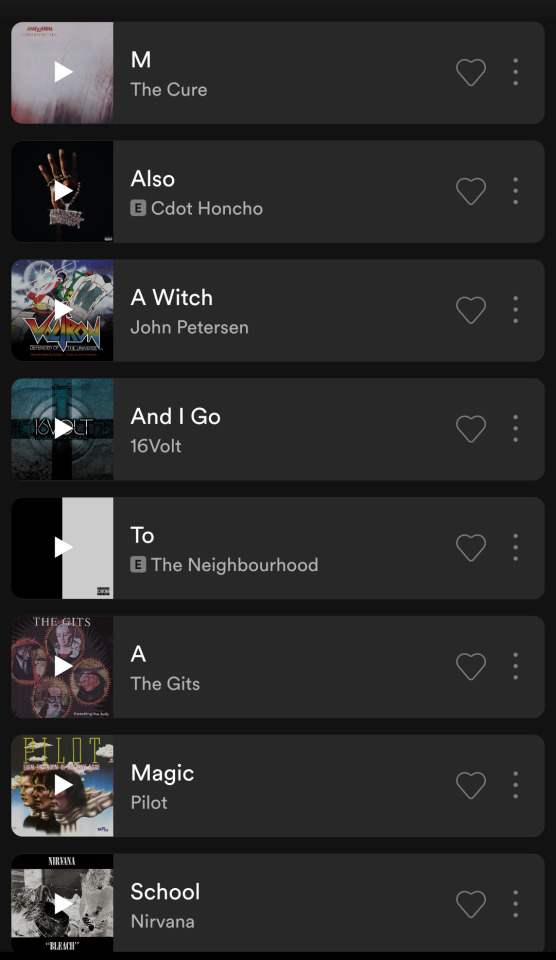


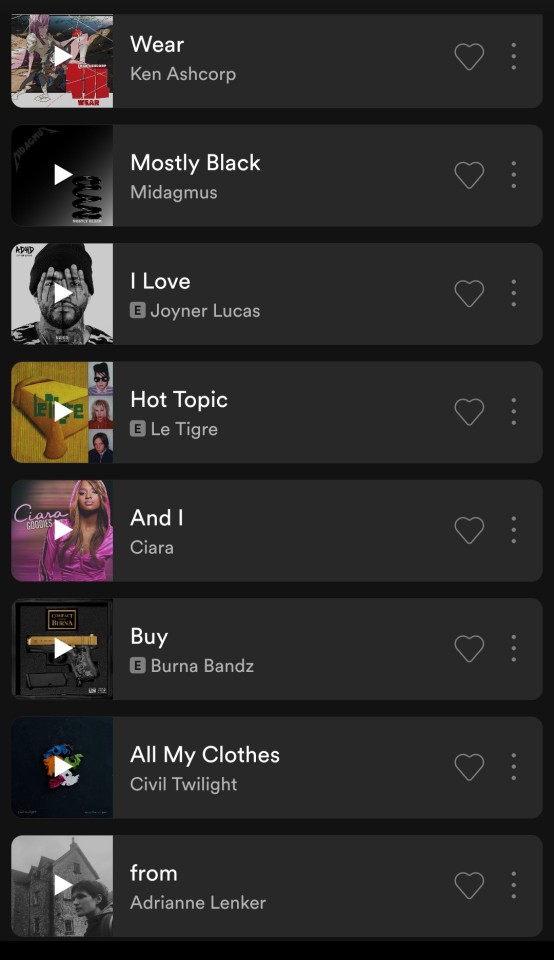

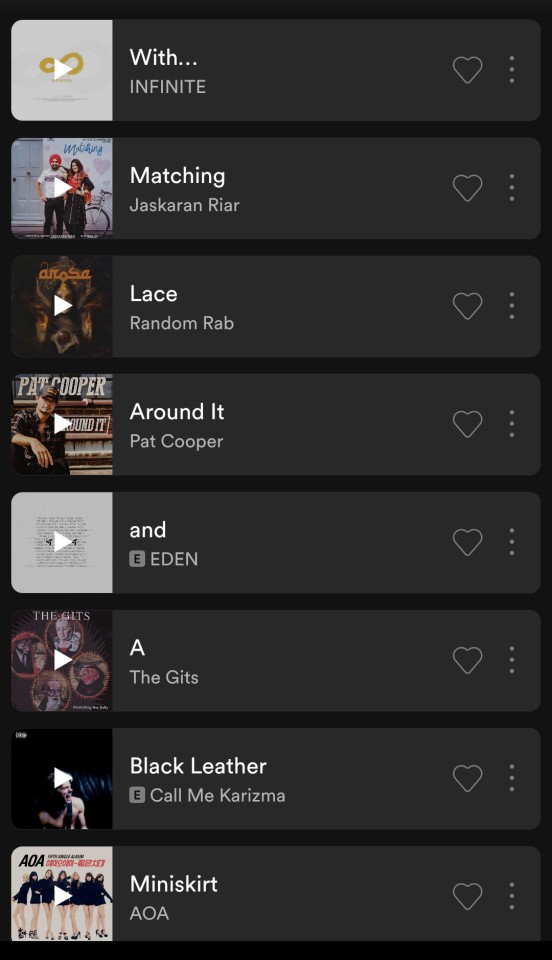
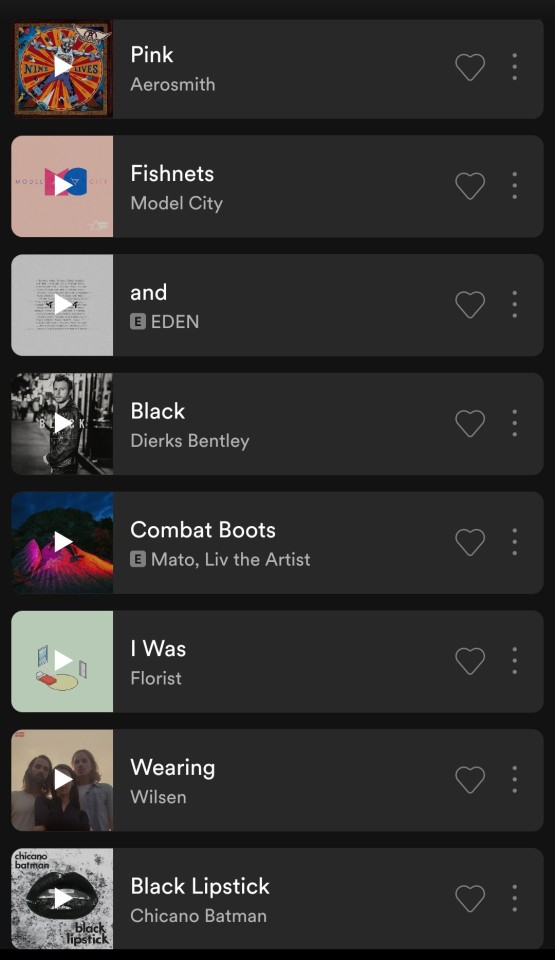
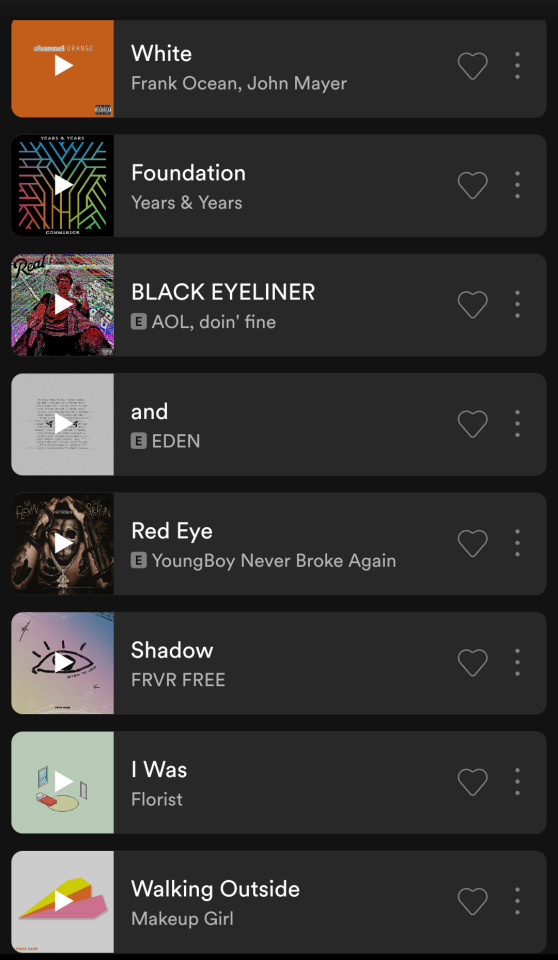
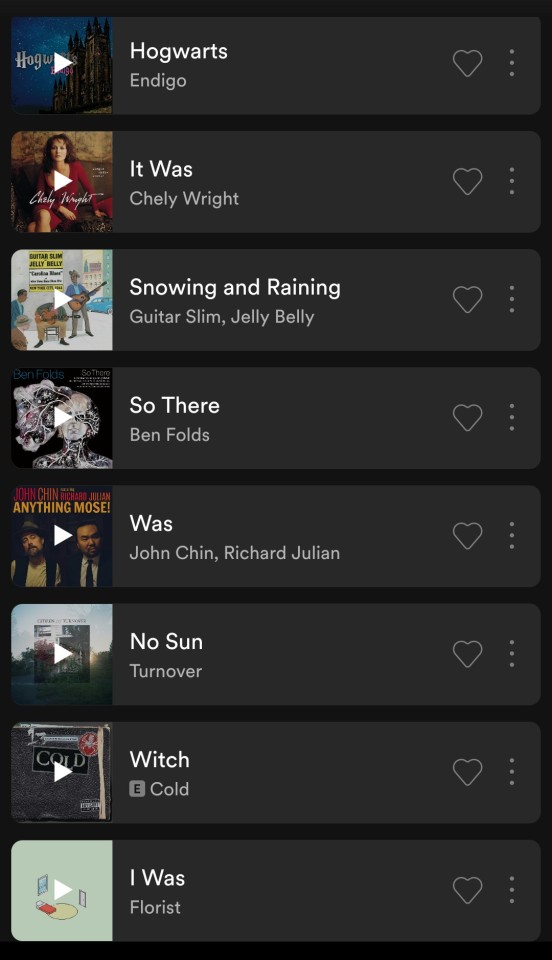
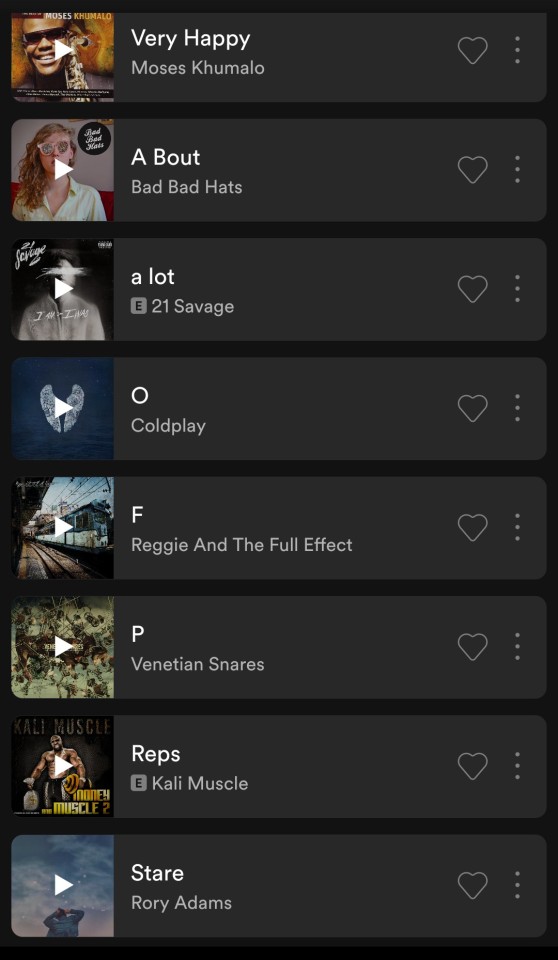
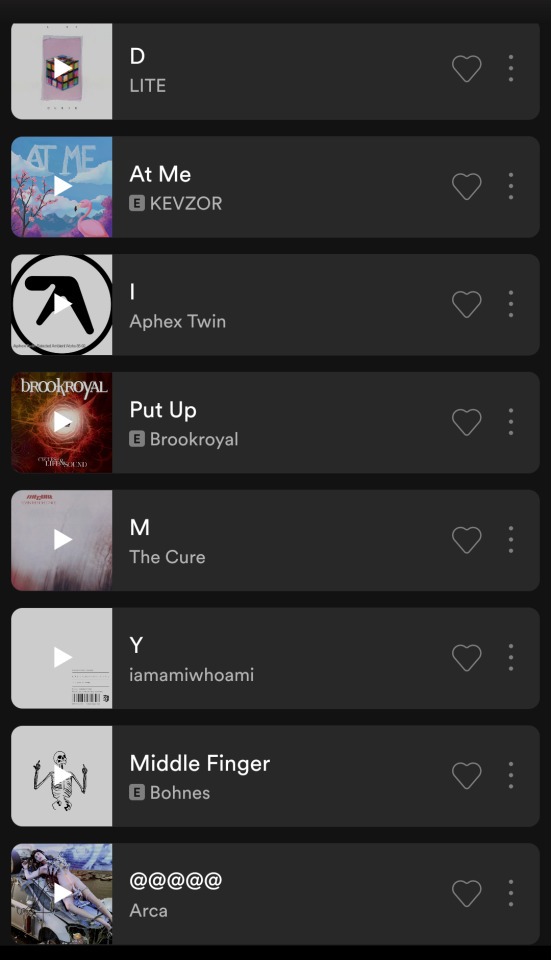

71K notes
·
View notes
Text
You can't put an old head on young shoulders
- JENNIFER LOPEZ'S BALANCED CALF
- ELLIE GOULDING'S BALANCED CALF
- JONATHAN RHYS MEYERS'S BALANCED CALF
- ELLE FANNING'S BALANCED CALF
- GAVIN DEGRAW'S BALANCED CALF
- LANCE BASS'S BALANCED CALF
- DOLLY PARTON'S BALANCED CALF
- SWIZZ BEATZ'S BALANCED CALF
- ANNALYNNE MCCORD'S BALANCED CALF
- JASON MESNICK'S BALANCED CALF
- NELLY FURTADO'S BALANCED CALF
- RICKY MARTIN'S BALANCED CALF
- PHIL MICKELSON'S BALANCED CALF
- KATHERINE HEIGL'S BALANCED CALF
- CIARA'S BALANCED CALF
- FLORENCE HENDERSON'S BALANCED CALF
- EMILY MAYNARD'S BALANCED CALF
- REGGIE BUSH'S BALANCED CALF
0 notes
Text
📚 Katelyn’s 2022 Booklist 📚
January
The Change (Animorphs #13) by K.A. Applegate
The Unknown (Animorphs #14) by K.A. Applegate
The Escape (Animorphs #15) by K.A. Applegate
Amish Grace: How Forgiveness Transcended Tragedy by David L. Weaver-Zercher, Donald Kraybill, and Steven Nolt
Mississippi Jack: Being an Account of the Further Waterborne Adventures of Jacky Faber, Midshipman, Fine Lady, and Lily of the West (Bloody Jack #5) by L.A. Meyer (reread)
February
The Weight of Our Sky by Hanna Alkaf
King and the Dragonflies by Kacen Callender
The Whole-Brain Child: Twelve Revolutionary Strategies to Nurture Your Child’s Developing Mind by Daniel J. Siegel, M.D. and Tina Payne Bryson, Ph.D.
March
Trying Differently Rather Than Harder: Fetal Alcohol Spectrum Disorders by Diane Malbin, M.S.W.
Bonhoeffer’s Black Jesus: Harlem Renaissance Theology and an Ethic of Resistance by Reggie L. Williams
Cinder (The Lunar Chronicles #1) by Marissa Meyer (reread)
April
Call Down the Hawk (The Dreamer Trilogy #1) by Maggie Stiefvater
The Dream Thieves (The Raven Cycle #2) by Maggie Stiefvater (reread)
May
Queen of the Tiles by Hanna Alkaf
The Warning (Animorphs #16) by K.A. Applegate
#booklist#k.a. applegate#animorphs#amish grace#mississippi jack#bloody jack#l.a. meyer#the weight of our sky#hanna alkaf#king and the dragonflies#kacen callender#the whole-brain child#daniel j. seigel#tina payne bryson#fasd#diane malbin#dietrich bonhoeffer#bonhoeffer’s black jesus#reggie l. williams#cinder#lunar chronicles#marissa meyer#call down the hawk#the dreamer trilogy#maggie stiefvater#trc#the raven cycle#the dream thieves#queen of the tiles
7 notes
·
View notes
Note
How would you rewrite/reboot Super Sons?
Jon Kent:
8 years old (about to become 9)
Violet eyes and freckles
Damian Wayne:
11 years old ( about to turn 12)
A little cocky and arrogant but overall: a good hearted kid.
Based his personality off of kid trunks instead of the stereotypical killiua from Hunter x Hunter
Super-Sons:
Plot is the same except for the villain: Reggie Meyer
He got his powers from a asteroid instead of the amazo virus (plus family too)
He wears a superhero outfit, based on the OG Kid Amazo, he wears a skin tight purple suit with a orange bandana mask with purple gloves and boots.
After a battle much later on, Reggie wears the armor suit he wears from the comics as a Darth Vader suit (got heavily injured by the super-sons years later, details coming soon 😉)
Adventures of the Super-sons
The kid legion of doom/injustice league is the same, but the kids are kids on earth who look up to the villains on earth instead of the heroes,
The book stays on earth instead of the multiple planets/galaxies we saw
It’s more grounded than sci-fi, no cube plot.
For the ending, Robin gets himself a Robin version of Rex Luther’s power suit and helps Jon defeat him (both also gave him a wedgie and pulling it over his head XD)
Challenge of the super sons
Same exact plot but instead of the justice league, it’s (new) Young Justice instead.
#jon kent#jon samuel kent#jonathan samuel kent#jon el#jonathan kent#damian wayne#damian wayne dc#damian al ghul#jondami#damijon
15 notes
·
View notes
Text
Until we get some more backstory for Willie, i’m gonna assume he was Seth Clearwater before he died and he just has amnesia
Caleb is the one who named him Willie
#julie and the phantoms#willex#Netflix#willie#hotdog#Alex#luke patterson#Reggie#julie molina#seth clearwater#twilight saga#stephenie meyer#crossover#fanfiction#amnesia#ghosts#backstory#werewolves#caleb covington#mine
70 notes
·
View notes
Text
Brew—Heat & Between Reflections (Clean Feed)

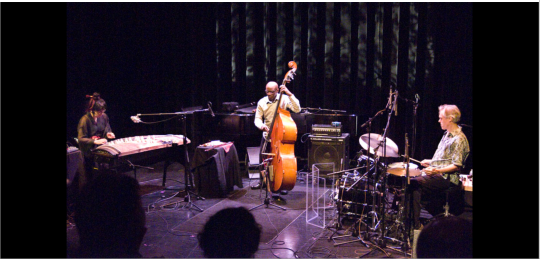
Brew is a trio that has existed since the late 1990s, when Miya Masaoka and Reggie Workman invited Gerry Hemingway to join their duo. They gigged and recorded enough around that time to put together a debut album, Brew, but never managed to line up its official release. They kept working together, and during a visit that Hemingway made back to New York (he currently lives and teaches in Switzerland) in late 2019 they checked into Acoustic Recordings for a day to make another record. Apparently Hemingway’s robust ongoing relationship with the Portuguese Clean Feed label propped the door of opportunity open wide enough to turn one album into two, so now we can consider 20 years in the history of a band you might not even have known existed.
Before considering the merits of Brew and Between Reflections as recordings, this has to be said — what a band! The unlikeliness of its line-up — one experimental koto player, one bassist who has John Coltrane, Art Blakey, and the New York Art Quartet on his c.v., and one drummer who juggles concepts, meters and sounds in settings as diverse as a piano trio playing Billy Strayhorn tunes and a band led by Anthony Braxton — is easily forgotten once you hear the depth of their rapport. Each musician places their distinct understanding of their instrument at the service of a mercurial collective sound, yielding consistently thrilling results.
Take “Message From The Outside,” from Brew. You could say that it’s just a sustained groove, and you wouldn’t be wrong. But to hear how the sound swells as Masaoka’s strings stir sonic whirlpools within Hemingway’s constantly mutating patterns, and how Workman’s bowing slices through them without knocking a beat out of place, is to hear how much masters can do with the essentials. Or consider “One For Walt Dickerson,” on which Hemingway switches to vibes and Masaoka distorts her strings like a rock guitarist. The novelty of Masaoka’s sounds in proximity to the solemn vibe that Hemingway and Workman establish is undeniable, but what registers is the patience with which the music unfolds, and the sense of eeriness that its juxtapositions impart.
The combination of recording sessions that span twenty-one years tempts the listener to consider how the group may have changed over that time, and one can definitely hear changes in recording technology, and effects, and inclinations towards multi-instrumentalism. But what persists is how well these musicians facilitate the manifestation of an uncommon common sound.
Bill Meyer
#brew#heat and between reflections#clean feed#bill meyer#albumreview#dusted magazine#jazz#miyah masaoka#reggie workman#gerry hemingway#Bandcamp
3 notes
·
View notes
Text
youtube
Worst of 2021 TV Shows #2: Riverdale (CW)
When you see an absolute train wreck there’s the old adage that you don’t want to look away.
When it comes to the further adventures of Archie Betty jughead Veronica and the gang from Riverdale, boy did you just want to leave it with jughead supposed death in season three.
Because oh have the mighty have fallen.
What began as a simple murder mystery has had so many moments of wtf pulled around so many ways and means that even with a timeskip, that shows Army Archie, Agent Betty, Socialite Veronica and Writers Block Jughead return to prevent Hiram Lodge from essentially making the town extinct you think to yourself. Has everyone gone crazier in that town or are they immune from Covid.
More so with intended shared universe mate Chilling Adventures of Sabrina finally showing up as Cheryl Blossom goes full Scarlet Witch in a 5 part alternate reality event.
How much more of this nonsense can be possible.
I’ll let Alex Meyers (who apparently is a big fan of donut land from super Mario world as it’s all he plays as his bgm) explain.
Cause I lost the comprehension to do so after the Luke perry tribute episode.
SUM 22: Even The Weird Mysteries Weekday morning cartoon show had nothing on Archie and companies current live action mulligan of a so called show.
#riverdale#kj apa#cole sprouse#archie comics#archie x betty#betty x jughead#jughead x archie#riverdale season five#train wreck#Veronica#veronica x reggie#rivervale#worst tv shows of 2021#worst of the year#worst tv shows of the year#2#Archie cw#alex meyers#Youtube
5 notes
·
View notes
Text
Potential angst concept
What we know about the boys history is: Alexa parents failed him after he came out to them, Reggie’s folks fought so much they about to divorce and Luke ran aaay after an argument with his mother which he regretted ever since. But we don’t know about the other parts of the lives. Like did Alex have a crush on anyone when he was alive? Did Reggie have siblings?
Now everyone knows by now that I’d like Idina Menzel and Josh Dallas to play Reggie’s older sister and her husband. And that is like them to be Nick’s parebts as well. (I really don’t buy into it hole Danforth-Evans theory. The logistics and logic simply don’t fit and I don’t want that fatuous egotist anywhere near Ryan or Nick thank you very much).
So I put to you. Alex used to have a crush on the character played by Dallas. The ages work cause Dallas was also born in 1978 like the boys were. The boys die. Dallas character wasn’t especially close to any of them but he mourns them, gets close to Menzel sister character. They get together a while after and have Nick down the line.
Now think of how it could impact the boys. Alex’s former crush married three sister of one of his best friends and they have a kid who was the former crush of their new sister and is now possessed by a psycho who owns Alex’s current crush’s soul. Yeah it’s complicated. But I think it could work. Bonus points is there’s flashbacks to when they were alive and after they died so we see the whole thing play out. The only real question is who would play the younger versions of the older two. Personally. I’m thinking Peyton Meyerand Zoey Deutch. Tell me what you think
11 notes
·
View notes
Text
I genuinely think Roberto might have handed over authorship of Riverdale to Stephanie Meyer after season 1, and just not told anyone.
#stephanie meyer#roberto aguirre sacasa#riverdaleseason3#riverdale#riverdale spoilers#cheryl blossom#cheryl x toni#cheryl bombshell#toni topaz#sweet pea#bughead#fangs fogarty#jughead#betty x jughead#jughead jones#betty cooper#veronica x reggie#veronica lodge#archie andrews#archie comics
105 notes
·
View notes